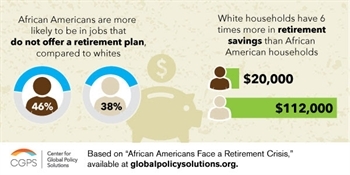The Retirement Crisis Facing African Americans
Reprinted from BlackStar Project - Forbes, By Rodney Brooks, Next Avenue Contributor March 9, 2017
Published: January 23, 2018


There's a saying: When white America catches a cold, black America catches pneumonia. So, if there is an impending retirement crisis in America, what does that mean for African Americans? The answer to that question is discouraging.
African Americans Tend Not to Invest in Stocks
Some analysts also say that African Americans often shy away from investing in the stock market. "Whatever discretionary income we have, we tend not to invest in equities," says Rockeymoore. "We don't have a diversification."
This may be due to a lack of comfort with the stock market. "African Americans are risk-averse," says Deborah Owens, a former Fidelity Investments vice president who calls herself America's Wealth Coach. "So, one of the major reasons they have less in retirement savings is they are ultra-conservative, particularly African Americans who work in the public sector and nonprofit organizations."
Owens says black investors typically focus on guaranteed or fixed investments that are low-risk or no-risk. As a result, their retirement funds aren't compounding at a high rate of return.
According to the Federal Reserve, the average balance of African Americans in 401(k)s is only $23,000. And
Social Security and the Racial Gap in Retirement Wealth found the average balance for African Americans in pensions and IRAs was $10,300, vs. $105,600 for white Americans.
Owens believes many African American workers don't take full advantage of all the choices in their employer-sponsored plans because they don't understand them. "The tendency to be risk averse is directly correlated to their lack of knowledge," she says.
What Employers and Policymakers Could Do to Help
James Brewer, president of Envision Wealth Planning in Chicago and president of the Association of African American Financial Advisors says African Americans need financial advice on issues such as having higher student loan debt than white counterparts and, often, a greater need to financially assist less affluent family members. Maya Rockeymoore, President of Center for Global Policy Solutions in Washington, D.C. says African Americans, even in retirement, tend to support other family members, including children and adult children. Also, they are disproportionately taking care of grandchildren, making them unable to save more for retirement.
All in all, says Rockeymoore: "There needs to be a national campaign to encourage young African Americans to save and invest. Home ownership is the pathway to wealth. They [blacks] need to be educated in the homebuying process and also to diversify their investments to include stocks and bonds."
McKernan believes policymakers also need to take action to close the racial retirement security gap. "This country is built on the premise that it provides economic opportunity," she says. "But this country continues a history of discrimination and the result of that is passed from generation to generation."